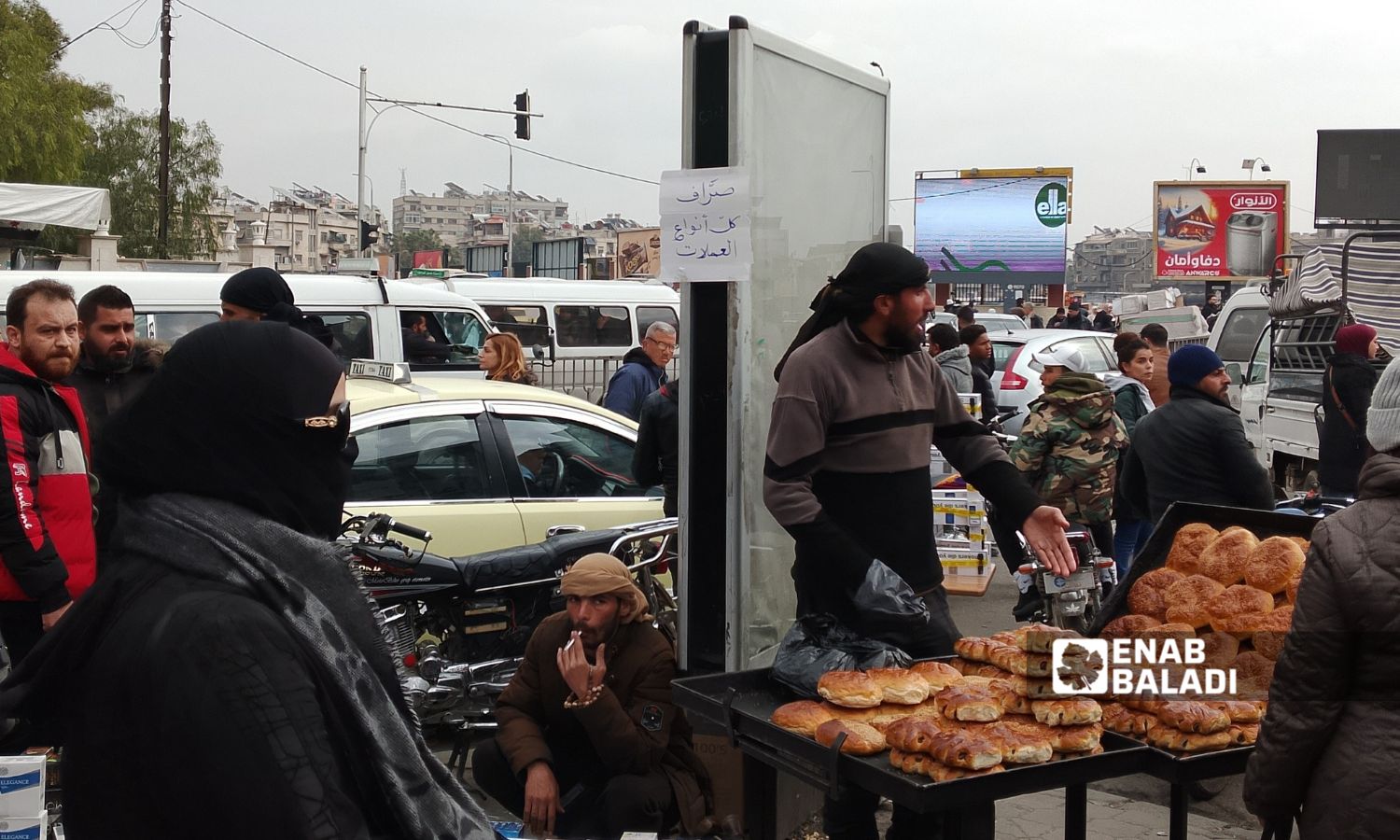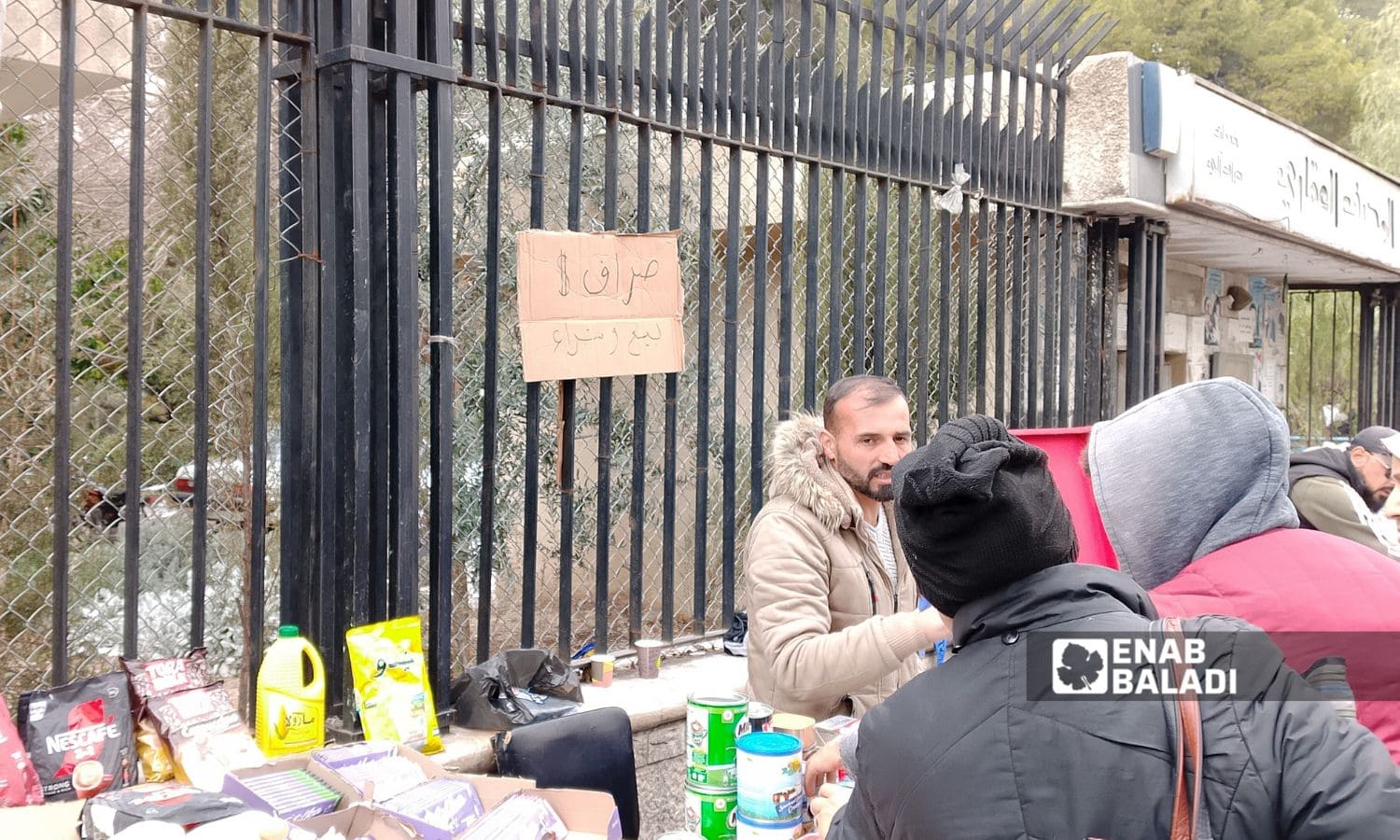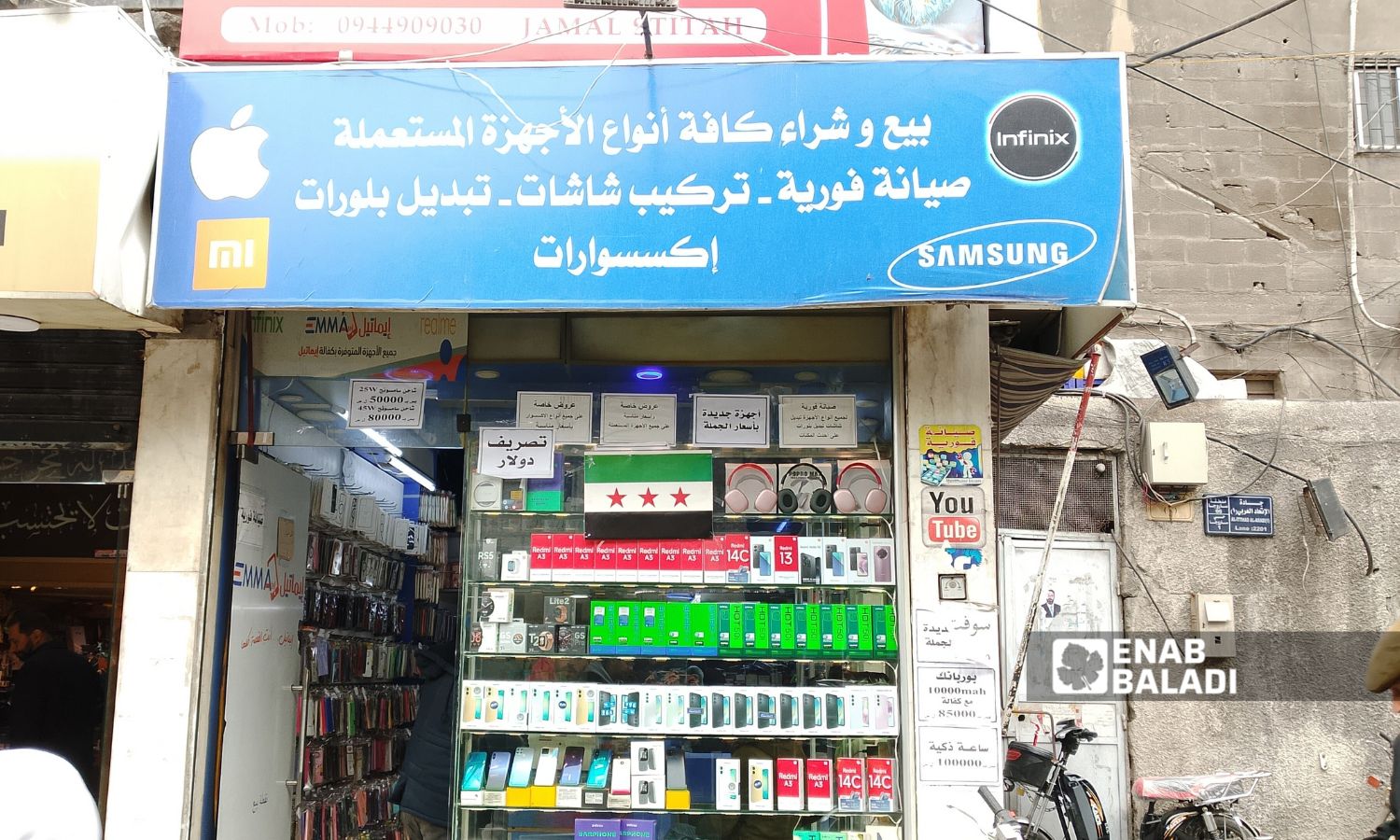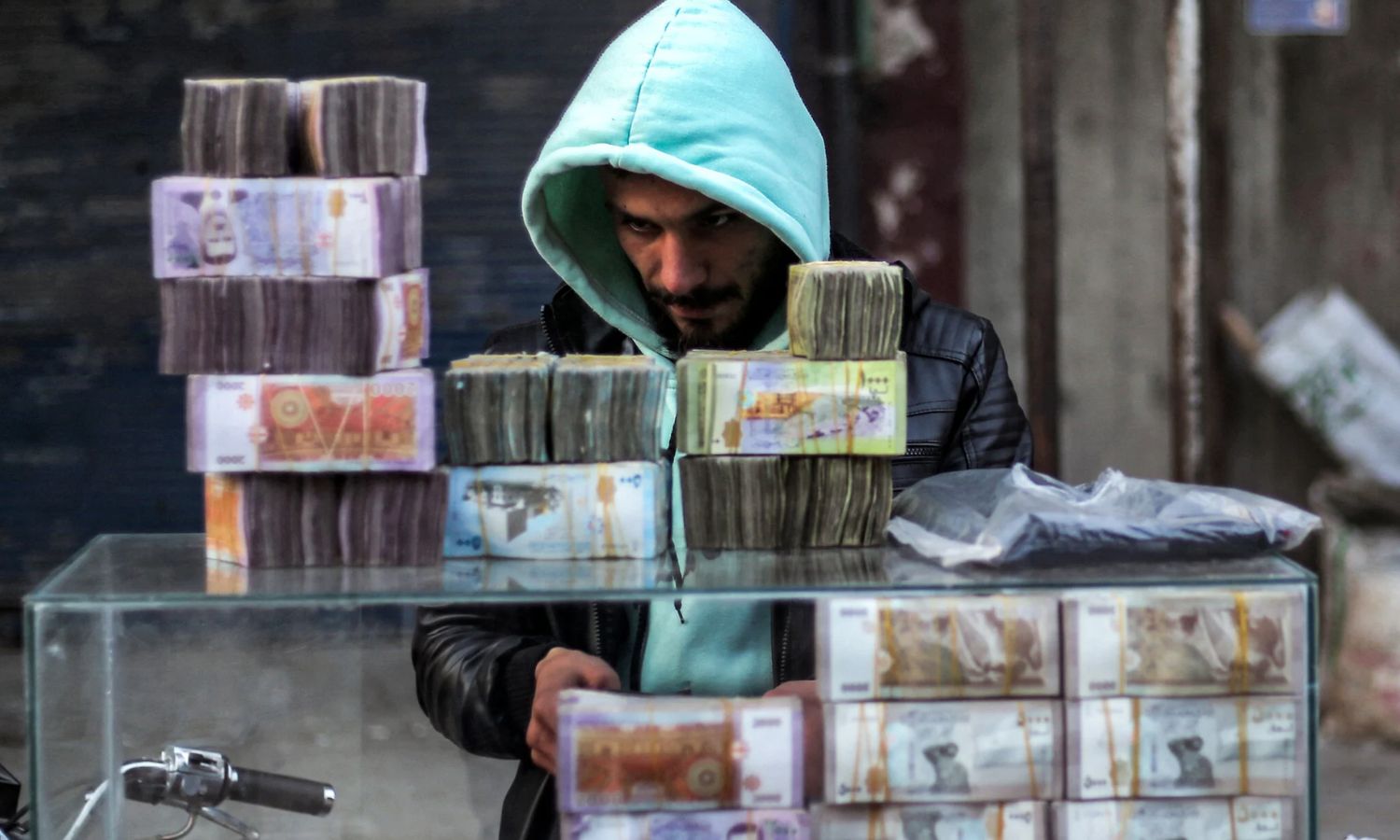



Enab Baladi – Omar Alaa Eldin
In the streets of Damascus, stalls operate to exchange dollars and other foreign currencies, with each stall offering a different price for the dollar based on the seller’s mood and goals for the exchange, amid official neglect of this chaos in the currency exchange profession.
Most people resort to these stalls due to banks’ reluctance, both public and private, to buy or sell dollars to citizens.
The Syrian pound began to strengthen against the dollar on January 26, when the dollar first recorded 11,600 pounds, after stabilizing for a period at 11,650 pounds.
The pound continued to improve until it reached 7,900 pounds against the dollar on February 4, only to decline again and stabilize around 10,000 pounds against the dollar, according to the specialized exchange rate site “S-P Today.”
Enab Baladi conducted a tour of several currency traders in the Baramkeh area of Damascus, asking them about the exchange rates for the dollar, which ranged between 9,500 and 10,000 Syrian pounds from one trader to another within the same area.
“Abo Ali,” a cigarette seller at the entrance of the Faculty of Law in Baramkeh, explained that most people who engage in dollar exchange in this area, in addition to selling in their shops or stalls, buy dollars from people at a lower price than advertised, and then use them to purchase new goods, which increases their profits more than if they had bought those goods in Syrian pounds.
Abo Ali mentioned that when exchanging dollars, he refers to a “list” issued by several merchants present in the al-Marjeh area, whom he described as “big traders.”
He said, “I have been working in this profession since 2011, and what we see today is very annoying, as most people’s savings are evaporating due to this fluctuation in the exchange rate. In recent days, most people have refrained from exchanging dollars, fearing that their money will lose value.”

A vendor selling food and cleaning supplies in the Baramkeh area of Damascus is dealing in dollars – February 9, 2025 (Enab Baladi/Omar Alaa Eldin)
In al-Hijaz Square in Damascus, just meters away from the Commercial Bank of Syria, Enab Baladi met a young man who sells cigarettes and some canned goods from a small stall, along with engaging in dollar exchange.
The young man explained that he earns 10,000 Syrian pounds for exchanging every 100 dollars, and he exchanges between 1,000 to 1,200 dollars daily, later selling it to one of the approved currency traders at the Central Bank of Syria (CBS).
According to his information, “big traders” exchange amounts reaching 400,000 dollars daily in the Central Bank, and he only deals with them.
Enab Baladi tried to communicate with the Central Bank of Syria to inquire about the dollar situation in the Syrian market and the reason behind some public banks’ reluctance to exchange dollars, but no response had been received by the time this report was published.
During Enab Baladi‘s tour in Damascus, the widespread practice of currency exchange was observed among many shops, especially in the Damascus Tower, known for selling mobile phones and tablets.
Walid al-Ahmad, a mobile phone store owner, said that the reason he engages in currency exchange is that he buys goods in dollars, and none of the traders he deals with accept transacting in Syrian pounds due to its instability, while the dollar is considered “a stable value.”

A mobile devices store in the Damascus Tower is dealing in dollars – February 9, 2025 (Enab Baladi/Omar Alaa Eldin)
Hassan Hazouri, a professor in the Faculty of Economics at Aleppo University, believes that what is currently happening in the stalls and streets represents a “parallel market” chaos.
Hazouri pointed out in an interview with Enab Baladi that currency exchange stalls are a profession that does not require a degree or experience, and their profits are high because they rely on speculation.
The economics professor added that there are “mafias” with significant liquidity that speculate daily on the Syrian pound, both upward and downward.
The term “speculation” does not have a precise definition, but it generally refers to the buying of short-term assets and achieving quick profits from them, involving a high level of risk and uncertainty regarding returns. It is a game of probabilities, according to the Osoul Center for Financial Studies and Consultations.
According to Dr. Hassan Hazouri, the danger of these stalls lies in promoting counterfeit currencies and the negative effects it has on both the economy and citizens.
He also noted that there are those with liquidity who sell the dollar in licensed banks at the official price, then buy dollars from the parallel market, benefiting from the price difference between the official and parallel markets, in collaboration with some bank employees, with the aim of making profits and material benefits.

A currency trader in the market of Manbij city in Aleppo province, northern Syria – January 4, 2025 (AFP)
The reason Syrians are resorting to exchanges from stalls is due to official banks’ refusal to exchange dollars and a policy of liquidity lockdown adopted by the Central Bank, which has naturally led to the theft of their savings, according to Hazouri.
Dr. Hani Khoury, a member of the Economic Sciences Association, called for exchange to be practiced only by licensed entities and individuals accountable for their actions, and that currency exchange should not be an unregulated practice within various shops.
According to Khoury, although it is sometimes the right of the trader to receive payment for their goods in a currency other than the Syrian pound, it is not their right to engage in currency exchange or abandon the national currency in their transactions.
He emphasized that, in all cases, the phenomenon of uncontrolled currency exchange remains dangerous and negative, reflecting chaos in transactions and their departure from the framework of monitoring information and analyzing the volume of currency exchange and trading.
Dr. Hassan Hazouri suggested allowing the licensing of currency exchange companies and offices under acceptable financial conditions and relaxed controls, by organizing the currency exchange profession similarly to what was applied in Idlib previously.
In May 2017, Hayat Tahrir al-Sham (which led the battles that led to the overthrow of the Syrian regime) established the General Monetary Agency for Cash Management and Consumer Protection, to monitor the currency exchange and remittance market.
Hayat Tahrir al-Sham (HTS) justified the establishment of this institution at that time by organizing currency exchange operations and preventing monopolizing and manipulation of currency prices.
Legally, Hassan Hazouri explained that the law prohibiting non-Syrian pound transactions and criminalizing transactions in dollar currency is still theoretically in effect and that an official decision should be issued to freeze it.
He added that authorities can stop currency traders on the streets whenever they want, but there is a form of “turning a blind eye.”
On January 18, 2020, ousted president Bashar al-Assad issued Decree No. “3,” tightening penalties against those dealing in currencies other than the Syrian pound.
The decree stipulates that anyone who deals in currencies other than the Syrian pound as a means of payment will face “hard labor for a temporary period of no less than seven years.”
It also imposes “a financial penalty equivalent to twice the value of the payments or amounts exchanged or collected or services or goods offered,” in addition to confiscation of the payments or amounts exchanged or precious metals for the benefit of the Central Bank of Syria.
The Central Bank of Syria maintains an exchange rate ranging from 13,000 to 13,056 pounds for buying and selling, a rate that has remained relatively fixed since the fall of the ousted Bashar al-Assad regime on December 8, 2024.
However, the Central Bank refrains from exchanging currencies, while currency exchange companies have closed due to market fluctuations, in a policy that experts say aims to “lock the pound up.”
if you think the article contain wrong information or you have additional details Send Correction